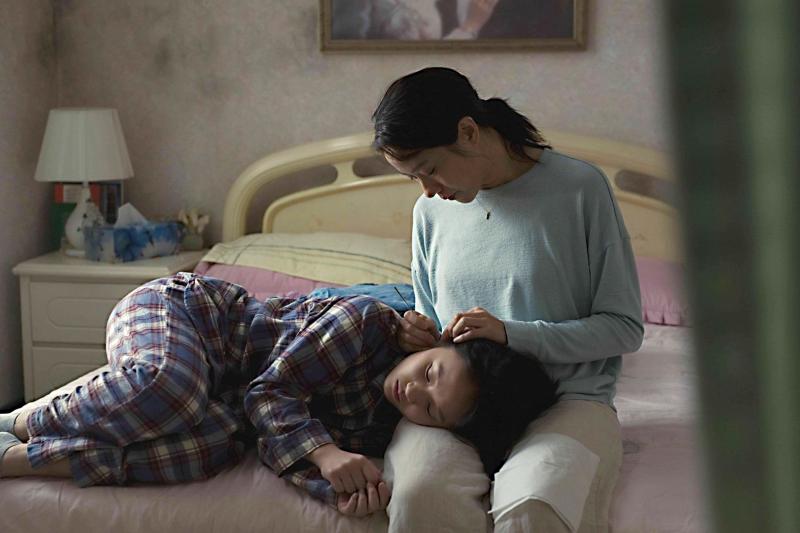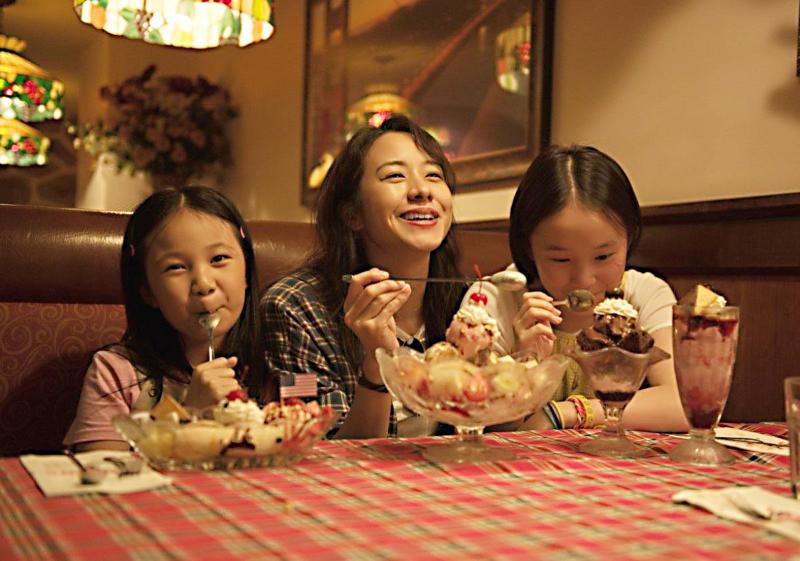American Girl (美國女孩) is a slice-of-life drama that captures a short but turbulent period in the life of 13-year-old Fen (Caitlin Fang, 方郁婷), who is suddenly transplanted from Los Angeles to Taipei, where her father works, due to her mother’s cancer treatment.
The much hyped film was made available last week on Netflix after a strong Golden Horse showing last year: Fiona Roan Feng-i (阮鳳儀) won best new director, Fang claimed best new actor while the film won best cinematography and the Audience Choice Award.
The challenges of adapting to a new culture and its school system will resonate strongly with diaspora kids caught between both worlds. The details — from being hit by a teacher over bad test scores, to being called “American” by classmates and wolfing down banana floats at Swensen’s for a taste of home — are trips down memory lane.

Photo courtesy of iFilm
Meanwhile, the 2003 SARS epidemic looms, and the film puts great care into reconstructing the social and cultural atmosphere of Taiwan during that era. The story mirrors Roan’s real-life experiences, drawing from a period in her upbringing and her family’s relationship.
Even though they can speak Mandarin, Fen and her sister Ann encounter difficulties adapting to their new environs while dealing with their frazzled parents. It’s reverse culture shock for Fen, who already had to go through this process when they first moved to the US. She adapted well, becoming a straight-A student with a best friend who shares her passion for horse riding, and desperately wants to return to America. Whether simply going back will fix all her problems is something she has to grapple with.
Their mother Lily (Carena Lam, 林嘉欣) isn’t coping well with her illness, and it’s taking a toll on the family. She frequently brings up her possible death and seeks something to blame it on, while father Huay (Kaiser Chuang, 莊凱勛) is under pressure to provide a better living for his family. He cares for the children and tries to connect with them, but he barely knows them.

Photo courtesy of iFilm
Even though Fen is the main focus, she’s not the only one who is dealing with distress; the entire family is in turmoil as the adults are not well enough to keep their lives entirely together.
Lily and Huay have much to figure out as they’ve been living in separate countries, only reunited under unfortunate circumstances. They aren’t just relegated to the background as the protagonist finds her way; they’re given depth as flawed, complex characters, providing some genuinely happy moments for their kids during this unhappy time.
Huay and surprisingly mature Ann play vital roles too as they cope in their own ways, but Fen and Lily’s temperamental conflict is what makes the film.
Most of Fen’s frustrations are directed toward her mother, and she lashes out whenever Lily speaks about dying. While Fang won the acting award, Lam does a solid job portraying Lily, who isn’t the most sympathetic character. She resents her illness and her circumstances, especially Fen’s constant complaining about Taiwan and acting out. The two do share some poignant conversations that speak to gender roles in Asia, such as Lily wanting to be reborn as a man in the next life.
These nuances add much to the film, keeping it from becoming another feel-good, melodramatic, coming-of-age movie with a big message and teary reconciliation.
In fact, there aren’t really any major transformations or revelations in the movie. Life just goes on.
Instead of harping on the obvious, Roan seeks more to explore the intricate mother-daughter relationship — especially in Asian society — and make sense of the messy yet often-unspoken emotions and ties that ultimately bind a family together.

That US assistance was a model for Taiwan’s spectacular development success was early recognized by policymakers and analysts. In a report to the US Congress for the fiscal year 1962, former President John F. Kennedy noted Taiwan’s “rapid economic growth,” was “producing a substantial net gain in living.” Kennedy had a stake in Taiwan’s achievements and the US’ official development assistance (ODA) in general: In September 1961, his entreaty to make the 1960s a “decade of development,” and an accompanying proposal for dedicated legislation to this end, had been formalized by congressional passage of the Foreign Assistance Act. Two

Despite the intense sunshine, we were hardly breaking a sweat as we cruised along the flat, dedicated bike lane, well protected from the heat by a canopy of trees. The electric assist on the bikes likely made a difference, too. Far removed from the bustle and noise of the Taichung traffic, we admired the serene rural scenery, making our way over rivers, alongside rice paddies and through pear orchards. Our route for the day covered two bike paths that connect in Fengyuan District (豐原) and are best done together. The Hou-Feng Bike Path (后豐鐵馬道) runs southward from Houli District (后里) while the

March 31 to April 6 On May 13, 1950, National Taiwan University Hospital otolaryngologist Su You-peng (蘇友鵬) was summoned to the director’s office. He thought someone had complained about him practicing the violin at night, but when he entered the room, he knew something was terribly wrong. He saw several burly men who appeared to be government secret agents, and three other resident doctors: internist Hsu Chiang (許強), dermatologist Hu Pao-chen (胡寶珍) and ophthalmologist Hu Hsin-lin (胡鑫麟). They were handcuffed, herded onto two jeeps and taken to the Secrecy Bureau (保密局) for questioning. Su was still in his doctor’s robes at

Mirror mirror on the wall, what’s the fairest Disney live-action remake of them all? Wait, mirror. Hold on a second. Maybe choosing from the likes of Alice in Wonderland (2010), Mulan (2020) and The Lion King (2019) isn’t such a good idea. Mirror, on second thought, what’s on Netflix? Even the most devoted fans would have to acknowledge that these have not been the most illustrious illustrations of Disney magic. At their best (Pete’s Dragon? Cinderella?) they breathe life into old classics that could use a little updating. At their worst, well, blue Will Smith. Given the rapacious rate of remakes in modern